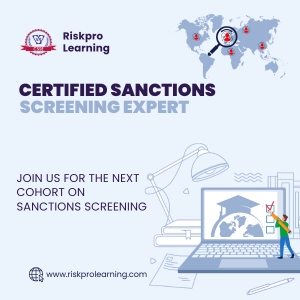In today’s interconnected financial world, sanctions screening has emerged as a linchpin of regulatory compliance. With geopolitical tensions driving an ever-evolving web of sanctions regimes—from the U.S. Office of Foreign Assets Control (OFAC) to the European Union and United Nations—organizations face immense pressure to identify sanctioned entities accurately and efficiently.
A single oversight can lead to multimillion-dollar fines, reputational damage, or even criminal liability. Yet, the complexity of screening, with its layers of ambiguous data and hidden connections, demands more than just advanced software. It requires skilled professionals who can navigate the nuances of global regulations and make informed decisions under pressure.
The growing importance of sanctions screening reflects broader trends in financial crime prevention. Regulators worldwide are intensifying scrutiny, pushing firms to bolster their compliance frameworks.
For instance, recent enforcement actions have highlighted cases where banks failed to detect transactions linked to sanctioned jurisdictions, underscoring the need for robust processes. Meanwhile, the rise of decentralized finance and cross-border digital transactions adds new layers of risk, from obscured beneficial ownership to cryptocurrency-based money laundering.
Register Here for the Certified Sanctions Screening Course
In this high-stakes environment, expertise in sanctions screening isn’t just a competitive edge—it’s a necessity for safeguarding organizations and maintaining trust in the global financial system.
The Human Edge: Why Expertise Drives Effective Screening
While technology plays a pivotal role in sanctions screening, it’s the human element that often makes the difference. Algorithms can flag potential matches, but interpreting those results—discerning false positives from genuine risks—requires deep regulatory knowledge and practical experience.
A seasoned professional understands the subtleties of sanctions lists, knows how to investigate complex corporate structures, and can spot patterns that automated systems might miss. This expertise is especially critical when dealing with politically exposed persons (PEPs) or entities operating in high-risk jurisdictions, where context is everything.
Building such proficiency demands rigorous training that goes beyond theoretical concepts. Industry leaders are increasingly turning to specialized programs to equip their teams with actionable skills.
For example, Riskpro Learning’s Certified Sanctions Screening Expert (CSSE) course offers a comprehensive approach, blending global regulatory insights with hands-on learning. Led by expert Vedant Sangit, the program covers critical topics like international sanctions frameworks, risk-based screening methodologies, and strategies to combat money laundering and terrorism financing.
Vedant Sangit is the Internationally Acclaimed Faculty on International Sanctions
Through interactive case studies, participants tackle real-world scenarios, learning to analyze complex data sets and optimize screening processes. The course’s practical focus ensures professionals can apply their knowledge immediately, whether they’re enhancing compliance programs or advising on risk mitigation.
This kind of training also fosters adaptability—an essential trait in a field where regulations shift rapidly. Recent updates to sanctions lists, driven by conflicts or policy changes, highlight the need for professionals to stay current. Programs like the CSSE not only provide foundational expertise but also emphasize ongoing learning, helping individuals anticipate emerging risks.
For compliance officers, risk managers, or even consultants, such skills translate into greater confidence and credibility, enabling them to lead their organizations through turbulent regulatory waters.
How CSSE is Creating Jobs in India’s Crowded Compliance Market
A Career Catalyst: Seizing Opportunities in Compliance
The demand for sanctions screening expertise is surging, driven by both regulatory pressures and market dynamics. Financial institutions, fintech startups, and multinational corporations are all seeking professionals who can navigate the intricacies of compliance while supporting business growth.
Roles like compliance analyst, sanctions investigator, or risk consultant are no longer niche—they’re central to organizational strategy. According to industry reports, compliance-related job postings have risen steadily over the past decade, with sanctions expertise cited as a top requirement. This trend shows no signs of slowing, as regulators and stakeholders prioritize transparency and accountability.
For professionals, investing in specialized training can unlock significant career opportunities. Certifications that validate expertise, such as Riskpro Learning’s CSSE, are becoming a benchmark for employers.
Sanctions Resources of Regtechtimes for Quick Reference
The course’s structure—covering everything from sanctions evasion techniques to regulatory reporting—prepares participants for diverse roles across banking, insurance, and consulting. Its emphasis on practical tools, like screening optimization and due diligence, ensures graduates can deliver tangible value. Plus, the credibility of learning from an experienced instructor like Vedant Sangit adds weight to the credential, signaling a commitment to excellence.
Beyond career advancement, mastering sanctions screening empowers professionals to make a broader impact. By preventing illicit funds from flowing through legitimate systems, they contribute to global efforts against financial crime, from terrorism to human trafficking. This sense of purpose, combined with the field’s intellectual rigor, makes it uniquely rewarding.
For those eager to explore this path, resources like Riskpro Learning’s CSSE program offer a gateway to both skill-building and professional growth. As the compliance landscape evolves, those who seize these opportunities will shape the future of financial integrity.


